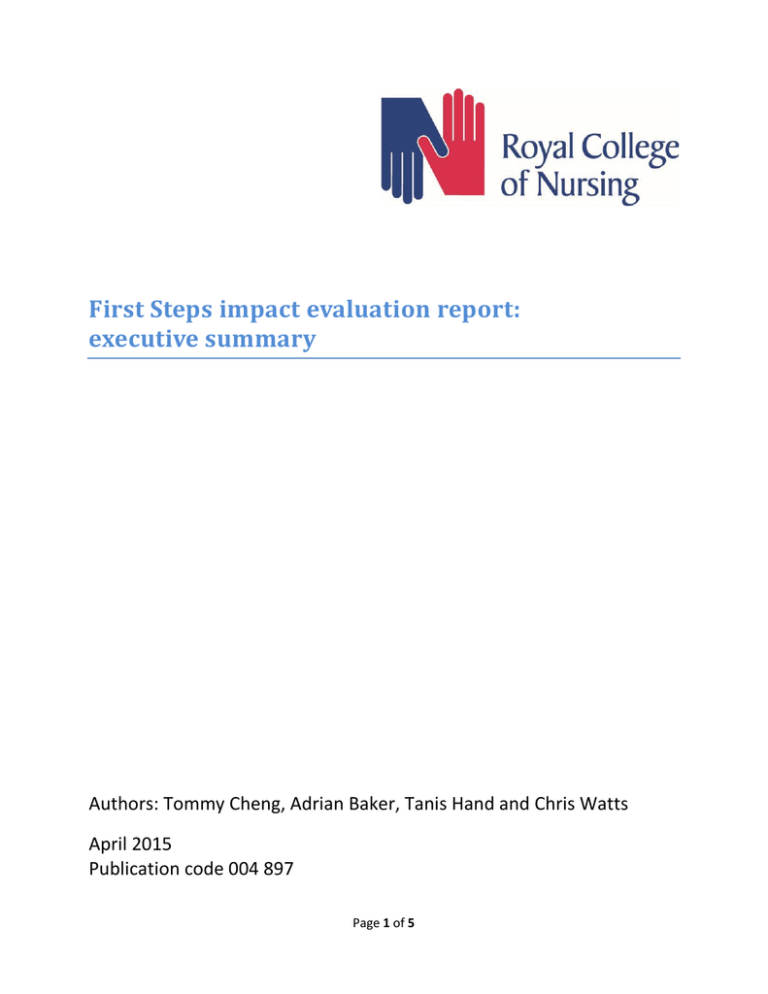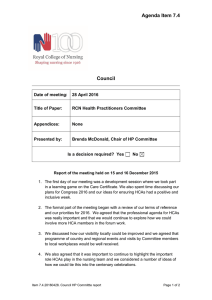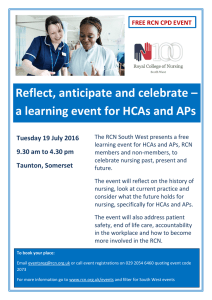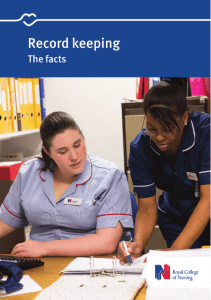First Steps impact evaluation report: executive summary
advertisement

First Steps impact evaluation report: executive summary Authors: Tommy Cheng, Adrian Baker, Tanis Hand and Chris Watts April 2015 Publication code 004 897 Page 1 of 5 Introduction The Royal College of Nursing (RCN) recognises that education and training are vital in enabling clinical staff to deliver high quality, compassionate care. As noted by Francis (2013), Cavendish (2013) and Willis (2015), there has been a widespread lack of consistency in standards for health care assistants’ (HCA) education for many years. The RCN developed the First Steps for HCAs learning resource in 2011 to support HCAs in acquiring the foundation skills and values that are vital to their role. First Steps is an online resource providing interactive training across six key topic areas: communication skills; health, safety and security issues; personal and people development; quality of care; equality, diversity and rights; and clinical skills. It is designed to complement local training schemes and is one of the many resources that the RCN has developed as part of its professional offer for members of the nursing team. Impact evaluation In 2014 the RCN undertook an impact evaluation of First Steps to assess its quality and impact on HCAs’ learning outcomes, as well as explore important contextual factors influencing people’s experience of and access to the resource. The results of this impact evaluation will inform the continued development of First Steps in line with user needs, and provide the strategic direction for the RCN in advancing its professional offer to the HCA workforce. The evaluation took a mixed methods approach across four phases. A mixed methods study design allowed a comparison of results from each phase against each other in order to triangulate the data. This increased the quality of the research, and supported development of robust recommendations for decision makers. Phase 1: a scoping review of existing literature examined the effectiveness of learning or training provision for HCAs, together with an analysis of analytics from current usage of First Steps. This initial analysis allowed us to scope and shape three further concurrent phases of data collection. Phase 2: an online analytical questionnaire was distributed to a sample of 62 previous First Steps users to measure self-reported learning outcomes amongst different types of users, and to understand context and experience of using the resource. Phase 3: a cohort group of 21 HCAs currently working in a front line setting with no previous experience of using First Steps undertook a health care knowledge test both before and three months after using the resource to assess any changes in their knowledge. Phase 4: a series of semi-structured interviews with eight HCAs and 12 representatives from health care providers (HCPs) explored the contextual reasons behind the impact and implementation of First Steps. Page 2 of 5 Results An evaluation was required because our knowledge of the impact of First Steps was limited Intelligence about the approach and impact of HCA training and education is limited. Our literature review found that, while there are many local foundational training and education programmes for HCAs, few studies evaluate their impact and effectiveness, with most being single site, narrow in scope and descriptive in nature. Analysis of metrics of visitor data suggested that First Steps is widely accessed and engagement is growing, with the First Steps website being the most highly visited of the RCN online resources. However such analytics alone are not a proxy for success. Further systematic assessment of learning outcomes from completion of First Steps, together with an exploration of user experience, motivation and engagement serves to enhance existing research findings and provides robust evidence for the RCN in further development of First Steps and planning the strategic direction for professional activities. HCAs who used First Steps found it useful, easy to use and learnt from the resource Respondents to our survey and interviews reported that the First Steps website was generally well regarded, easy to use, and the foundation level material informative and well-pitched for the target audience. The use of dynamic and interactive features in First Steps was rated highly and contributed to the clarity and accessibility of the resource. There was an overall perception that First Steps had contributed to improvements in individuals’ clinical practice, and findings from the survey and cohort studies give some further indication of this contribution. In the survey, self-reported learning outcomes were statistically significantly higher in the period after using First Steps than in the period before for each of the six modules that were covered in the learning resource. In the cohort study, health care knowledge scores were statistically significantly higher in the period after using First Steps than in the period before using it. Improvements in health care knowledge amongst HCAs is expected to lead to improvements in the delivery of patient care. Learning from First Steps can benefit all groups within the target audience, and has potential for further reach and uptake. Although it is likely that our survey respondents were from a particularly well-motivated and self-directed group of learners, within that group age and years of clinical experience made no difference to user learning outcomes. Some interview participants believed that inexperienced HCAs were not the only ones who benefited from First Steps, and suggested that registered nurses, experienced HCAs and managers may also Page 3 of 5 benefit from using the resource. Others indicated that they made additional use of First Steps as a reliable source of information for continued reference. Compatibility was also an important reason for First Steps being considered a good educational tool and supplement to in-house training. Many respondents felt that, as well as meeting the skills and core knowledge required of the HCA role, First Steps content also had close synergies with national targets and educational qualifications. Compatibility with the Care Certificate and the Qualifications and Credit Framework was mentioned in particular. The RCN is viewed as a recognised and trustworthy brand and this enhances the credibility of First Steps. At the same time, awareness of First Steps improves the RCN’s professional reputation Credibility of First Steps as a resource was aligned with perceptions of the RCN brand as producing trustworthy and quality material. Experience of high quality and responsive support to First Steps queries from the RCN also contributed to the described value of the resource By investing in the development of First Steps whilst making the resource freely accessible, the RCN increases its professional reputation to members and non-members. Survey respondents indicated they were more likely to join (80per cent) or retain membership (100per cent) of the RCN as a result of their experience with First Steps. First Steps enjoys unique advantages as a learning resource and the RCN should maximise this potential Due to its brand name and status, educational resources developed by the RCN enjoy a comparative advantage over its competitors. As there is currently an increasing demand for educational resources aimed at HCAs, there is real potential for the RCN to lead the way by further developing First Steps to meet this need. First Steps is now one of the few foundational training resources for HCAs which has been systematically assessed for effectiveness and found to be associated with improvements in learning outcomes for motivated users. As an online learning resource which can be utilised by many users with only minimal increases in variable costs, First Steps enjoys considerable economies of scale. There is potential for First Steps to reach further Visitor data alone can provide a misleading idea of the impact of a resource; our findings indicate that the use of First Steps has predominantly been driven by champions both within and outside the RCN. The dissemination of First Steps to new audiences has been overly reliant on peer-to peer Page 4 of 5 endorsements and there remains a large group of HCAs who could benefit from First Steps but are unaware of the resource. Our findings are limited by the First Steps users we have been able to reach, and it is likely that respondents to all phases consist predominantly of well-motivated and self-directed learners. While our evaluation suggests that First Steps has enjoyed considerable success in reaching this substantial group of what may be termed ‘early adopters’ amongst HCAs, continued success will depend on a strategic approach to understanding and targeting users currently unaware or unable to access First Steps, or in some way disenfranchised from it. IT infrastructure in the health care sector was identified as an impediment, due to both access to the resource and the use of its dynamic and interactive elements which was one of its identified strengths. These issues obliged many to take up use of the resource at home in their own time, and it is unclear how this barrier may affect use by less motivated learners. It is likely that there remains a substantial number of HCAs for whom First Steps is out of reach, through an inability to gain access, due to a lack of available time or motivation, either personally or from their organisation. More understanding is needed of the extent of this group, together with possible mechanisms to reach them. Workplace cultural norms such as a perception that when HCAs are using computers in the office they are ‘not working’ was cited as another barrier. When this is combined with work pressures, the successful use of First Steps is likely to be dependent on buy-in and understanding from senior managers. Recommendations It is of fundamental importance that a learning resource is effective in improving learning outcomes for those who use it. Visitor metrics alone from the First Steps website should therefore not be used as a proxy for its success and should instead be combined with a systematic assessment of the resource based on learning outcomes and user experiences. First Steps has been found to be successful in improving learning outcomes for our group of predominantly well-motivated and self-directed early adopters. A strategy needs to be developed to identify and reach out to other groups who may face challenges and barriers that deter or prevent them from using the resource. It is likely that the use of new technologies and innovations such as the First Steps resource will be increasingly used to overcome traditional barriers and costs to learning. The RCN is trusted by HCAs for its brand name and the RCN should utilise this advantage by further developing new material and new features to support First Steps become the go to online educational and reference resource for HCAs. The material on First Steps can be increased in breadth and complexity so that it supports tiered learning to support the outputs from the Shape of Caring review (Willis, 2015). The structure of First Steps can also be optimised to improve its functionality as an online reference tool. Page 5 of 5


